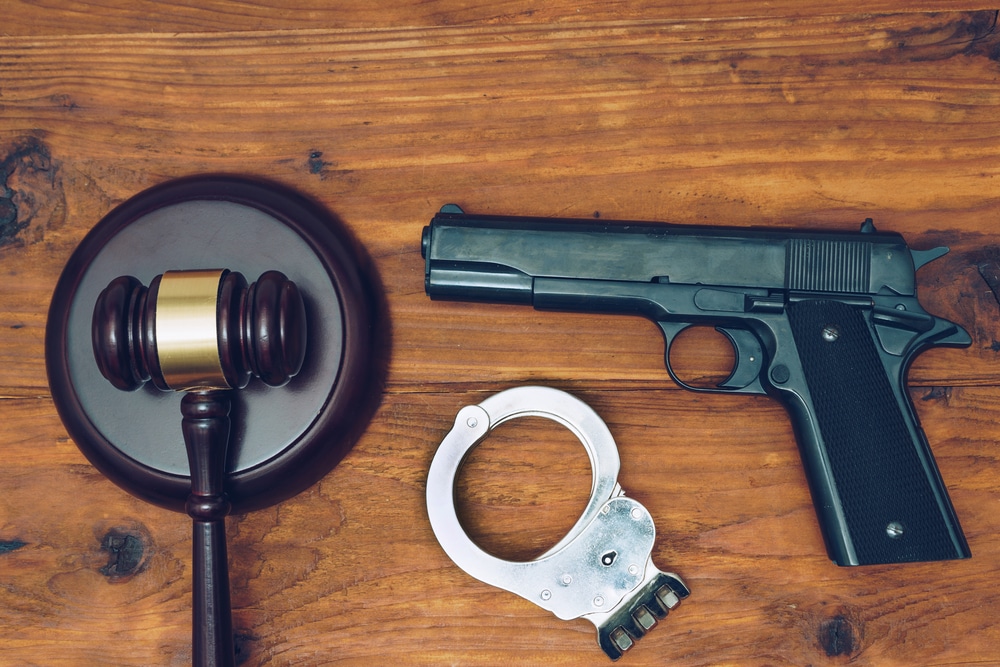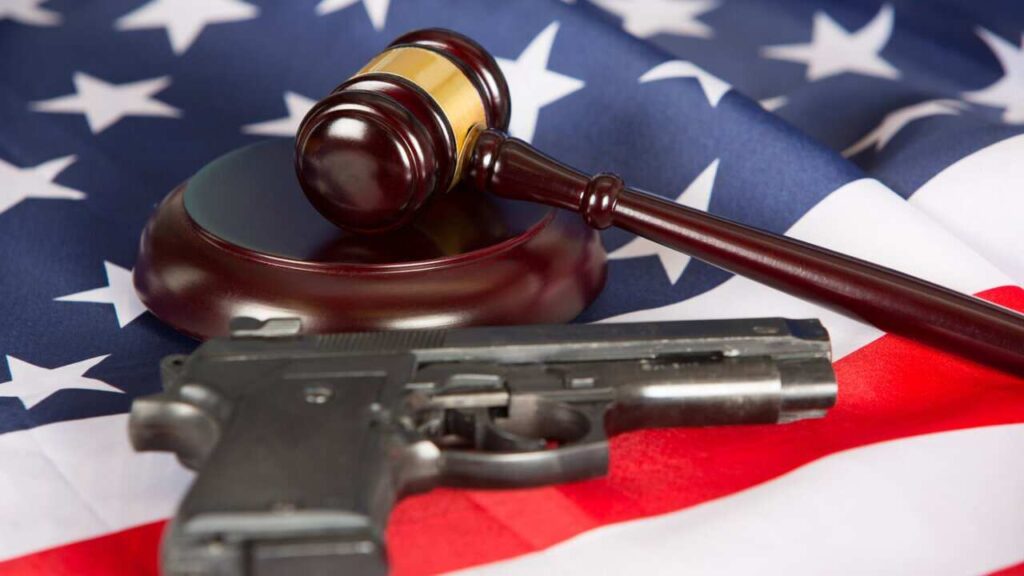It’s a common misunderstanding: if you didn’t fire a gun, how could you possibly be charged with a gun crime? But in Massachusetts, just having a firearm, even if it never leaves your glove box, can land you in serious legal trouble.
Let’s walk through what counts as a gun crime in Massachusetts, what the law says about possession versus use, and how prosecutors in Worcester and the surrounding towns actually apply these rules.
What Counts As A Gun Crime In Massachusetts?
You can be charged with a gun crime for possessing, carrying, or improperly storing a firearm, even if it’s never fired.
Under M.G.L. c. 269 § 10, Massachusetts classifies a wide range of activities as criminal when it comes to firearms. “Gun crime” doesn’t just mean using a weapon violently. It can also include:
- Possession without a valid license
- Carrying a loaded firearm outside your home or business
- Improper storage, especially around children
- Transporting a gun without following safety regulations
- Assault with a dangerous weapon (even if not fired)
You’re expected to have the right license, usually a License to Carry (LTC) or Firearm Identification Card (FID), and to follow extremely specific storage and transportation rules. Even law-abiding gun owners can face charges for a minor mistake, like storing a weapon where a child could access it or transporting it in an unlocked case.
Massachusetts takes a preventative approach. The Massachusetts Gun Control Act aims to reduce the potential for harm by restricting not just use, but access and intent. The law assumes that if it’s accessible, it’s potentially dangerous.

Can You Be Arrested For Having A Gun In Your Car Without Using It?
Yes, carrying a firearm without the right license in your vehicle is a serious offense in Massachusetts, even if it’s never used.
Under M.G.L. c. 269 § 10(a) and 10(h), it’s illegal to carry a loaded or unloaded gun in your vehicle unless you’re licensed to do so. Even with a license, the gun must be transported according to specific rules. For example, it needs to be unloaded and stored in a locked container that’s not readily accessible.
If the police find a gun under your seat or in the glove box (and you don’t have a valid Massachusetts license), you could be charged under the state’s vehicle transport statute. This is true even if the gun is legally registered in another state. Massachusetts does not recognize out-of-state firearm licenses.
You can also be charged under constructive possession, which is a legal theory that says if you knew the gun was there and had control over the space (like your car), you’re responsible for it.
The Worcester Police Department and others in the region enforce these rules aggressively, especially following traffic stops.
What If You Had No Intention To Use It?
Under Massachusetts gun laws, intent isn’t always necessary. Many firearm offenses are strict liability crimes.
In criminal law, most offenses require a “guilty mind” or mens rea. But not all. Some laws are considered strict liability, meaning the mere act is enough, regardless of intent.
Under Massachusetts gun laws, carrying a firearm without a license is a strict liability offense. If you’re caught, prosecutors don’t need to prove you meant to harm anyone or even knew the law. The act of possession is what matters.
In Commonwealth v. Gouse, the Supreme Judicial Court of Massachusetts confirmed that knowledge or intent is not always a defense in gun cases. This approach reflects the state’s commitment to reducing gun violence by focusing on prevention, not just punishment.
So even if the gun was locked in the trunk, you weren’t planning to use it, and you thought your license was valid, you can still face charges.
Does It Matter If The Gun Was Locked Or Unloaded?
Yes, how and where a gun is stored or transported significantly affects whether charges apply and how severe they are.
Massachusetts has strict requirements under M.G.L. c. 140 § 131C and the gun storage statute. If you’re transporting a firearm, it must be:
- Unloaded
- Locked in a secure container
- Not within your immediate control unless you’re licensed
What doesn’t count: tossing an unloaded gun in the glove box. That’s not secure. It needs to be in a locked case, ideally in the trunk.
Courts use the “direct control” standard to decide if you had access to the weapon. If it’s within reach, even if you didn’t touch it, that could support a charge of unlawful possession.
And remember: just because a gun is unloaded doesn’t mean it’s legal. The law focuses on accessibility and intentional safety precautions, not whether the weapon could fire at that moment.

Can You Be Charged For Showing Or Pointing A Gun Without Firing?
Yes, brandishing or threatening someone with a firearm can lead to serious criminal charges, even without discharge.
Under M.G.L. c. 265 § 15B, you can be charged with assault with a dangerous weapon if you point a gun at someone in a threatening way. This includes:
- Waving it during an argument
- Displaying it to intimidate
- Pointing it during a road rage incident
This is often referred to as brandishing, although Massachusetts law doesn’t use that exact term. Courts look at your behavior. Did it cause fear? Was there a threat?
The Massachusetts Appeals Court has ruled that the presence of a firearm can elevate a simple threat to a felony-level assault.
So no, you don’t have to fire. In many cases, you don’t even need to say anything. The gesture is enough.
What Are Common Non-Firing Gun Charges In MA?
Many firearm offenses in Massachusetts involve possession, storage, or transport, without ever discharging the weapon.
Here are a few:
- Possession of ammunition without an FID
- Improper transport of a firearm in a vehicle
- Possessing a firearm near a school zone
- Unlawful carry without a license
- Tampering with a firearm’s serial number
- Section 10(h) charges for general unlawful possession
You can also be charged for carrying a weapon with an expired license, even if you were once fully compliant.
These charges often come up during routine police encounters: a traffic stop, a neighbor’s complaint, or even a noise disturbance.
Can You Face Federal Gun Charges Even If The Weapon Wasn’t Fired?
Yes, certain types of possession trigger federal offenses, especially if the weapon crosses state lines or you’re a prohibited person.
Under 18 U.S.C. § 922(g), you can be federally charged for possession if:
- You’re a convicted felon
- You’re a non-citizen without lawful status
- You’re subject to a restraining order
- You’ve been dishonorably discharged from the military
Federal cases often involve the ATF, and charges carry mandatory minimums. They may also overlap with state cases, meaning you could be charged in both state and federal court.
The U.S. District Court of Massachusetts handles these prosecutions, and penalties can be steep, even if the gun was never used.
What Defenses Can A Gun Charge Lawyer Use If The Weapon Wasn’t Used?
Your attorney may challenge how the weapon was found, whether you knew it was there, or if your rights were violated.
Common defenses include:
- Illegal search – Was the firearm discovered during a warrantless search that violated the Fourth Amendment?
- Lack of possession knowledge – Did you actually know the gun was in your bag, vehicle, or home?
- Motion to suppress – Was evidence collected unlawfully?
- Chain of custody errors – Can the prosecution prove that the weapon wasn’t tampered with?
The Worcester gun court procedures vary case by case, but a skilled defense lawyer will examine every detail, from the initial stop to how the firearm was handled.
Can Your Gun License Help As A Defense?
Sometimes, but it depends on whether your license was valid, current, and appropriate for the situation.
There are several types of licenses in Massachusetts:
- LTC (License to Carry) – Required for most handgun possession and open carry (though open carry is almost always discouraged).
- FID (Firearm Identification Card) – Covers non-large capacity rifles and shotguns.
- Restricted use license – May limit where and how you can carry.
If your license is expired, or you’re carrying a firearm that doesn’t match your license class, that’s not a valid defense. Always check renewal dates and what your license actually allows.

What Are The Penalties For Gun Charges Even If You Never Fired The Weapon?
You could face felony charges, mandatory jail time, and a permanent mark on your CORI record.
Penalties vary depending on the charge but may include:
- Mandatory minimums (18 months for some unlawful carry charges)
- Felony status (which affects housing, employment, and future rights)
- Listing on your CORI (Criminal Offender Record Information)
- Bail revocation under the dangerousness statute
If you’re charged in Worcester District Court, you’ll face serious scrutiny, even for technical violations.
FAQ
What’s the penalty for having a gun in your glove box?
You can be charged with unlawful possession, especially if the firearm isn’t secured or you don’t have the proper license. Penalties include jail time and felony classification.
Can I carry a gun if I have a license from another state?
No. Massachusetts does not recognize out-of-state licenses. You must have a valid Massachusetts LTC or FID.
Will I go to jail if I didn’t know the gun was in the car?
It’s possible. If prosecutors can prove constructive possession, you can still be charged, even without intent.
What happens if you forget to renew your LTC?
Carrying on an expired license can still lead to criminal charges. Renewal is your responsibility, and ignorance is not a defense.
If you’re facing any kind of gun charge in Worcester or the surrounding towns (Shrewsbury, Grafton, Millbury, or Auburn) get legal help right away. These aren’t charges you want to navigate alone.
